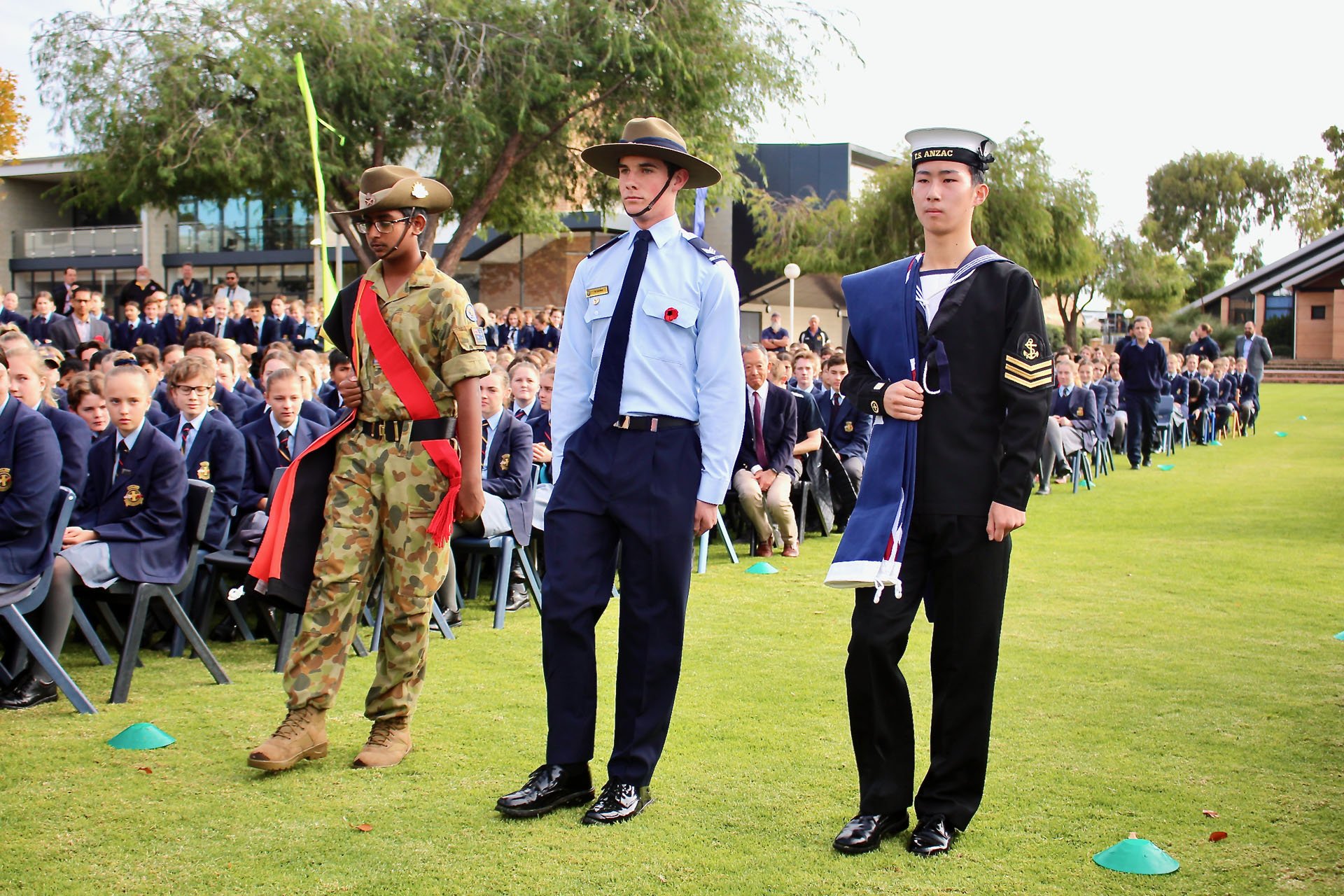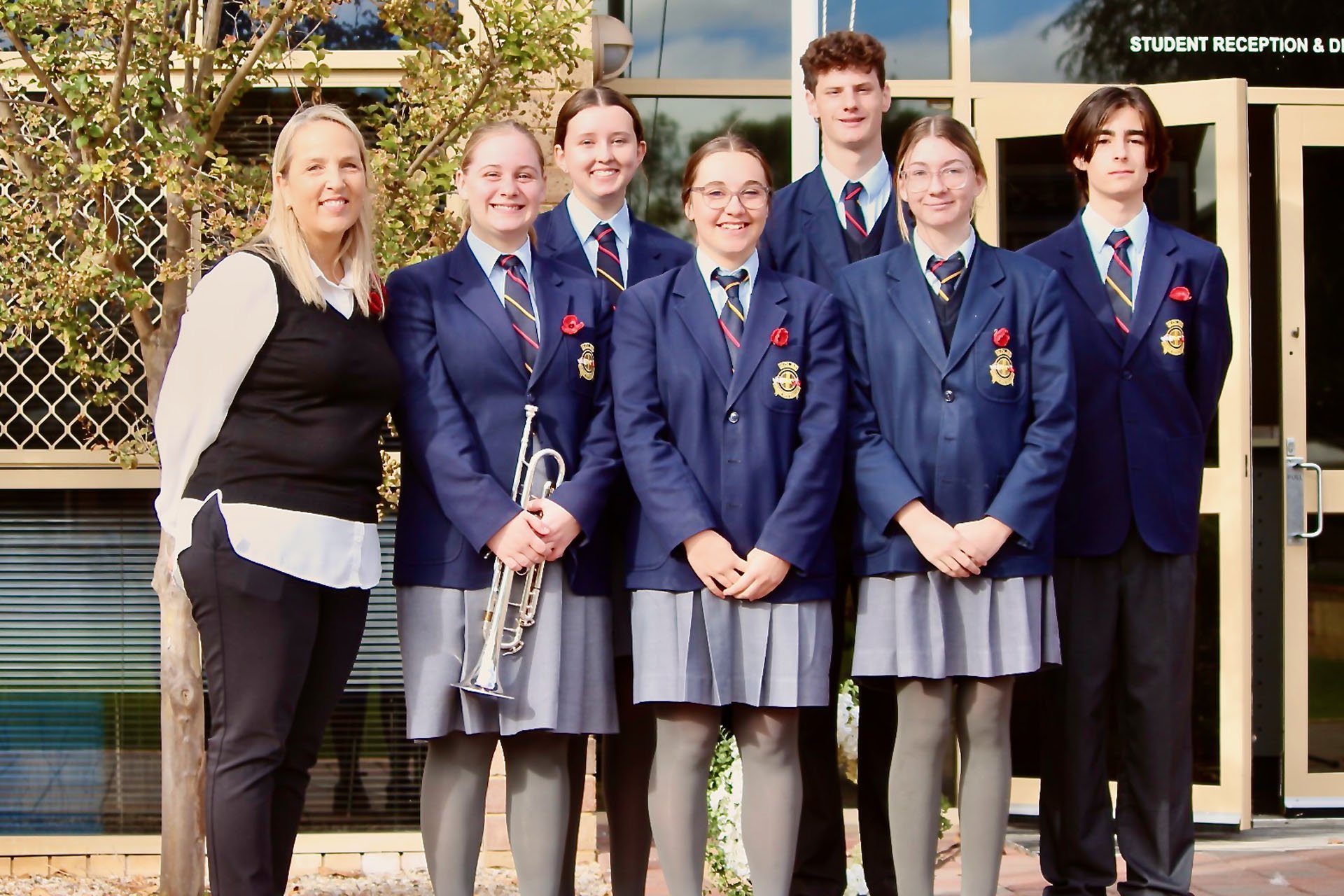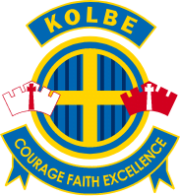LIFE AT KOLBE. THE KOLBE WAY.

Defence School Mentor
Meet Kolbe’s Defence School Mentor, Robin Delamont, who supports our Australian Defence Force (ADF) families.
As the spouse of a now-retired Australian Defence Force member, I understand the unusual challenges faced by ADF families. I am the mother of three young adults, who all attended and graduated from Kolbe Catholic College. I have not only raised Defence children but was also a Defence child myself, as my father served in the Army for 24 years. I’ve experienced moving my children to new schools and have also been the new student on numerous occasions, so I have a deep understanding of what my students and their families go through and can empathise with them.
It is my aim to help students from our ADF families thrive socially and academically while they receive a quality education at Kolbe. It is such a privilege to support the families of those who sacrifice so much in the service of our country.
God Bless
Mrs Robin Delamont

What is the Defence School Mentor Program?
The Defence School Mentor (DSM) Program provides support to secondary students of Australian Defence Force (ADF) members and their families, particularly during their transition in and out of a school on posting or during parental absences due to deployment. The DSM works with Kolbe’s Wellbeing Team and teaching staff to support the educational and emotional needs of our Defence students.
Defence families can change locations quite regularly, and due to differences in curriculum, subject selections and intake age requirements there can be considerable differences in their educational program from one school to the next. In addition to these pressures, a Defence family also has to re-establish community connections and create new friendships and support networks every time they are relocated.
The DSM Program was implemented by the Department of Defence as a commitment to support its members and their families. They recognise that the education of Defence dependents may be negatively impacted by their mobile lifestyle and so have sought to provide this innovative resource to facilitate a more supportive educational environment for ADF families.
Kolbe’s DSM Program provides Defence students and families with a range of support services including:
- welcoming students and their families to our College and supporting them during parental absences;
- organising incursions and excursions that encourage leadership, initiative and teamwork;
- liaising with teaching staff and the Wellbeing Team to monitor the social, emotional and academic wellbeing of Defence students;
- informing Defence families of social events within the region;
- assisting in the coordination of ANZAC Day and Remembrance Day ceremonies;
- organising opportunities for students to represent the school at external ceremonies and events;
- identifying programs, services, resources or opportunities that best suit their needs.
What does a Defence School Mentor do?
A Defence School Mentor provides assistance to students and their families, which may include:
- supporting students in their development of resilience and self-confidence;
- coordinating appropriate strategies to welcome and farewell students of ADF families;
- encouraging students to explore options and make the most of opportunities;
- assisting students in managing the challenges of transitions;
- referring students where necessary to appropriate student support services;
- identifying the issues and needs of individual students;
- developing and implementing programs and resources that address students’ issues and needs;
- monitoring students’ day-to-day social and emotional well-being;
- supporting students at school during times of parental absence from home for service requirements;
- facilitating student participation in cultural, sporting, academic and personal development programs;
- encouraging students’ active participation in the DSM Program.
Is there a Defence School Mentor in all high schools?
No. A school must have at least 35 students from Defence families to be eligible for program support. Kolbe Catholic College has long met this requirement due to the close proximity of the Royal Australian Navy base, HMAS Stirling, on Garden Island.
TEAM BUILDING ACTIVITIES
Excursions, incursions and recess/lunchtime activities are organised throughout the year for our defence students. This aims to encourage relationships to develop and to foster a supportive network amongst their peers and their Defence School Mentor, Robin Delamont. Participation is not compulsory, but encouraged.
Some of the activities offered are:
- Weekly group sport on Thursday mornings.
- Welcome barbecue for students and their families.
- Afterschool movie & pizza afternoon.
- Drop-in morning teas.
- End of year excursion to Adventure World.
- Involvement in external run defence events such as the Walk to Work Day at Garden Island and Welcome to the West in Perth.
ANZAC Service and Remembrance Day
Kolbe Catholic College maintains a strong connection with the ADF community and deeply values their contribution for the benefit of all Australians.
On ANZAC Day, the College Captains accompany the DSM to the Rockingham Cenotaph to lay a wreath from our grateful school community. Our whole-school ANZAC Assembly and morning tea aims to honour past and present service personnel and our cadets march with pride during the service.
There is a whole-school commemoration on Remembrance Day during which The Ode is read, and the Last Post and the Rouse are played.
USEFUL LINKS
DMFS Rockingham contact details:
PHONE: (08) 9529 8842
EMAIL: DMFS.WA@defence.gov.au
ADDRESS: 23 Chalgrove Avenue, ROCKINGHAM, WA 6168
WEBSITE: www.defence.gov.au/members-families/
Defence Member and Family Helpline: 1800 624 608
The Defence Member and Family Helpline is the first point of call for support, information and connection with your community, including your local DMFS team. The Helpline is available 24/7 and is staffed by qualified professionals, including social workers and psychologists. They can also provide advice on addresses and postal regulations for overseas deployments, and can facilitate the passing of urgent messages to deployed personnel.
